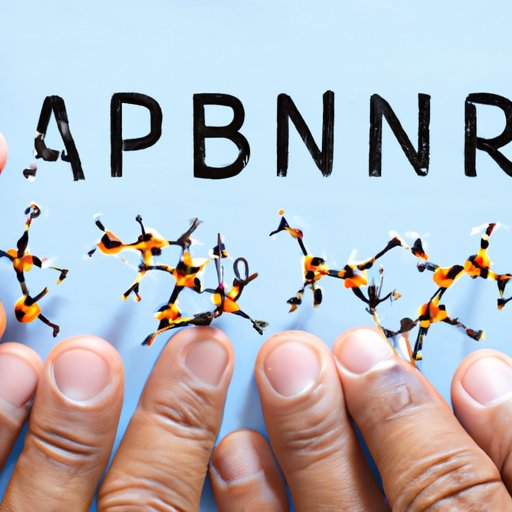Introduction
Gabapentin is an anticonvulsant medication that is commonly used to treat a variety of neurological conditions, including seizures and nerve pain. It works by altering the activity of certain neurotransmitters in the brain, which can help reduce symptoms of pain, anxiety, and depression. But what makes gabapentin so effective for treating nerve pain? In this article, we’ll explore how gabapentin works to relieve nerve pain and examine the science behind its effectiveness.

Exploring How Gabapentin Treats Nerve Pain
Gabapentin is a type of anticonvulsant medication that works by altering the activity of certain neurotransmitters in the brain, such as gamma-aminobutyric acid (GABA) and glutamate. By affecting these chemicals, gabapentin can help reduce symptoms of pain, anxiety, and depression. It is most commonly prescribed to treat epilepsy, but it is also used to treat a variety of other neurological conditions, including nerve pain.
Nerve pain, also known as neuropathy, is a condition characterized by pain or discomfort in the nerves. It can be caused by a variety of factors, including diabetes, cancer, autoimmune diseases, and physical trauma. Nerve pain can range from mild to severe, and it can affect any part of the body. Common symptoms include burning, numbness, tingling, and shooting pain.
Examining the Science Behind Gabapentin’s Effectiveness in Relieving Nerve Pain
Clinical trials and studies have shown that gabapentin can effectively reduce symptoms of nerve pain. In one study, researchers found that gabapentin was more effective than placebo in reducing pain intensity in patients with diabetic neuropathy. In another study, researchers found that gabapentin was more effective than placebo in reducing pain intensity in patients with postherpetic neuralgia.
However, it’s important to note that gabapentin may cause some side effects, including dizziness, drowsiness, and nausea. It’s also important to talk to your doctor before taking gabapentin, as it can interact with other medications, including blood thinners and antidepressants.

Analyzing the Mechanisms of Action of Gabapentin in Relieving Nerve Pain
So how does gabapentin actually work to relieve nerve pain? There are several possible mechanisms of action. First, gabapentin can block pain signals in the brain. By blocking the transmission of pain signals, gabapentin can reduce the sensation of pain.
Second, gabapentin can reduce inflammation and oxidative stress. Inflammation and oxidative stress are common causes of nerve pain, and gabapentin can help reduce these processes, thus providing relief from nerve pain.
Understanding How Gabapentin Alleviates Neuropathic Pain
Neuropathic pain is a type of nerve pain that is often associated with conditions such as diabetes and multiple sclerosis. Studies have shown that gabapentin can help reduce symptoms of neuropathic pain, such as burning, numbness, and tingling. The exact mechanism of action is not fully understood, but it is believed that gabapentin binds to certain receptors in the brain, which can help reduce the sensation of pain.
In addition, gabapentin can also help reduce inflammation and oxidative stress, which can further reduce symptoms of neuropathic pain. It can also help reduce anxiety and depression, which can help improve overall quality of life.
Researching the Benefits of Gabapentin in Managing Nerve-Related Pain
Gabapentin has been found to be effective in managing nerve-related pain, and there are several potential benefits. First, gabapentin can enhance the effects of other pain medications. When combined with other medications, gabapentin can increase the effectiveness of pain relief.
Second, gabapentin is generally considered safe. While there are some potential side effects, they are usually mild and do not last long. Additionally, gabapentin has fewer drug interactions than other medications, making it a good option for those who are taking multiple medications.

Investigating the Clinical Use of Gabapentin for Nerve Pain Relief
When considering whether to take gabapentin for nerve pain relief, it’s important to talk to your doctor first. Your doctor can advise you on the best treatment plan for your specific condition and provide guidelines for taking gabapentin. Factors to consider include the severity of your pain, your age, and any underlying medical conditions.
It’s also important to be aware of the potential side effects of gabapentin. These can include dizziness, drowsiness, and nausea. If you experience any of these side effects, it’s important to talk to your doctor right away.
Conclusion
Gabapentin is an effective drug for relieving nerve-related pain. It works by altering the activity of certain neurotransmitters in the brain, which can help reduce symptoms of pain, anxiety, and depression. While there are some potential side effects, gabapentin is generally considered safe and can be an effective treatment for nerve pain. However, it’s important to talk to your doctor before taking gabapentin, as it can interact with other medications. With the right treatment plan, gabapentin can help provide relief from nerve pain.
(Note: Is this article not meeting your expectations? Do you have knowledge or insights to share? Unlock new opportunities and expand your reach by joining our authors team. Click Registration to join us and share your expertise with our readers.)
